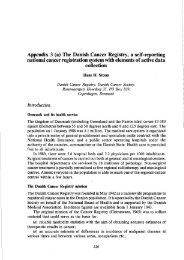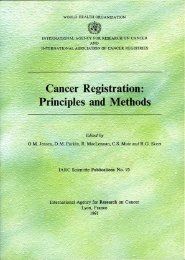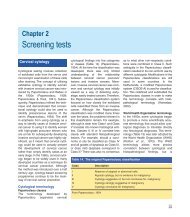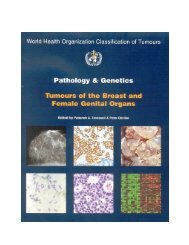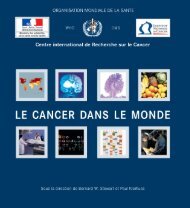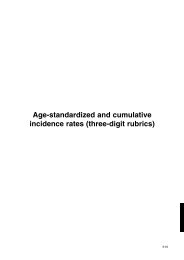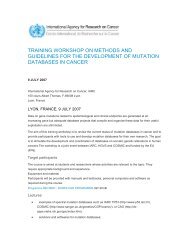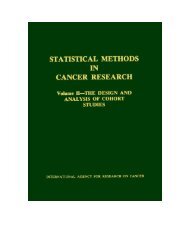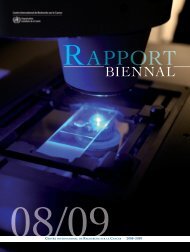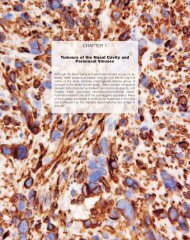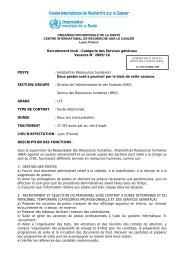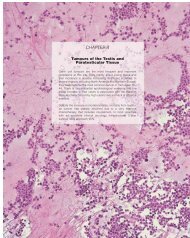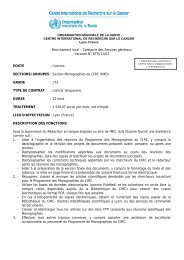world cancer report - iarc
world cancer report - iarc
world cancer report - iarc
You also want an ePaper? Increase the reach of your titles
YUMPU automatically turns print PDFs into web optimized ePapers that Google loves.
ETHICS AND CANCER<br />
Major ethical issues are inherent in almost<br />
all aspects of <strong>cancer</strong> control: primary prevention,<br />
screening and early diagnosis, treatment<br />
and terminal care. The design and management<br />
of research involving human subjects,<br />
including clinical trials, also generate<br />
important ethical questions.<br />
Ethical problems arise in a clinical, public<br />
health or research context when choosing<br />
between alternative decisions and may<br />
entail a conflict between different values,<br />
each regarded as intrinsically “good”. The<br />
first, indispensable step in ethical decision<br />
analysis is to recognize the existence of a<br />
potential ethical conflict beyond what may<br />
appear as a mere technical choice. For example,<br />
the physician’s assessment of the positive<br />
and negative consequences of a <strong>cancer</strong><br />
treatment (physical, psychological and<br />
social) may differ from that of the patient<br />
and this divergence must be fully taken into<br />
account. A current approach for the recognition<br />
and analysis of ethical problems is to<br />
view decisions in the light of three moral<br />
principles: autonomy, beneficence and justice.<br />
Autonomy dictates that personal choices<br />
by competent persons should not be constrained.<br />
Beneficence (and, prior to this, nonmaleficence,<br />
“first, do no harm”), dictates<br />
that the decision should benefit the recipients.<br />
Justice implies that every subject<br />
should be treated equally. Ethical problems<br />
arise because these principles very often<br />
conflict when applied to specific situations.<br />
Thus, offering a patient the widest scope of<br />
therapeutic resources, consistent with<br />
beneficence, may deprive others of resources,<br />
contrary to the principle of justice. A<br />
working scheme for ethical decision analysis<br />
involves examining choices in the light of the<br />
three principles as relevant to each of the<br />
parties affected, e.g. the patient, the physician,<br />
the relatives and the scientific community.<br />
Although some moral philosophers<br />
regard this procedure as inadequate, given<br />
the complex and unique nature of ethical<br />
conflict situations, the scheme has become<br />
a popular tool within biomedical ethics committees.<br />
322 Cancer control<br />
Ethical problems arise in primary prevention<br />
influencing personal behaviour, granted the<br />
impact of tobacco smoking, alcohol drinking,<br />
diet and sexual habits upon <strong>cancer</strong>.<br />
Individual behaviour should result from personal<br />
informed choices rather than being the<br />
product of psychological pressure, however<br />
well intentioned. However, respect for autonomy<br />
as well as beneficence converge in justifying<br />
vigorous anti-tobacco initiatives.<br />
In secondary prevention, the central ethical<br />
issues revolve around the level of benefit<br />
which warrants offering a screening procedure<br />
to healthy, asymptomatic individuals.<br />
Positive evidence of some benefit should be<br />
available, ideally in terms of reduced death<br />
rates. Those participating should be<br />
informed of relevant risks in a clear, balanced<br />
way. Screening for genetic predisposition to<br />
<strong>cancer</strong> in the general population is not yet<br />
feasible but genetic testing for some <strong>cancer</strong>s<br />
in high-risk families is established. Multiple<br />
ethical questions remain unanswered. For<br />
instance, should a young woman at risk of<br />
familial breast <strong>cancer</strong> consent to a test to<br />
determine whether she possesses a BRCA1<br />
mutation, and if so, at what age? What could<br />
be the effects of a positive test on her life,<br />
marriage and child-bearing? Will recognition<br />
that she is at risk materially improve her situation?<br />
Moreover, the investigator may be<br />
involved, if testing results in awareness of<br />
the genetic status of family members who<br />
have not provided any consent.<br />
Ethical problems in <strong>cancer</strong> treatment centre<br />
upon the need for more effective, safe therapies.<br />
Controlled randomized trials are necessary<br />
to ensure unbiased comparison of treatments.<br />
However, assigning patients on a random<br />
basis to the new or the old (best standard)<br />
treatment continues to raise legitimate<br />
concerns. The implicit hope when propounding<br />
a new treatment is that it is more effective<br />
than the standard one: it may be regarded<br />
as unethical not to offer such a hope to<br />
every patient. Such limitations can only be<br />
overcome by extensive discussion with the<br />
proposed participants, explaining the rationale<br />
of the investigation and the degree of<br />
hope and, at the same time, uncertainty that<br />
surrounds the alternative treatments and<br />
justifies randomization. Without this<br />
process, consent signed by a patient is not<br />
informed and is ethically unsatisfactory.<br />
Appropriate dialogue, information and communication<br />
can reduce the likelihood of<br />
patients and families relying to their detriment<br />
on untested but highly publicized<br />
treatments, and perhaps abandoning effective,<br />
if uncomfortable, therapy.<br />
Prevailing ethical attitudes, and consequent<br />
legal dispositions, vary <strong>world</strong>wide<br />
with respect to active interventions to terminate<br />
life for compassionate reasons.<br />
Such options are not legally available in<br />
most countries. An exception is Holland<br />
where, provided strict rules are followed to<br />
ascertain the patient’s wishes, these interventions<br />
are not regarded as legally punishable,<br />
the ultimate evaluation being left to<br />
the judicial authority. There is scant evidence<br />
that <strong>cancer</strong> patients faced with a<br />
poor prognosis, when given adequate support<br />
and care, seek life-ending interventions.<br />
Hence appropriate palliative care,<br />
guaranteeing the highest possible quality<br />
of life to the patient and to those close to<br />
him or her, is currently regarded from an<br />
ethical perspective as the most acceptable<br />
course of action.<br />
To conclude, first, there cannot be an ethically<br />
justifiable decision without informed<br />
participation of all individuals affected by<br />
the decision, however demanding this may<br />
be. Second, ethics committees, composed<br />
of representatives of all parties involved in<br />
decision-making, are essential for the protection<br />
of the individual. The terms of reference,<br />
guiding principles and operational<br />
procedures of these committees should be<br />
accessible to the community at large. Third,<br />
a continuous and critical self-scrutiny is<br />
required from all involved in order to focus<br />
on the substance of the ethical issues and<br />
quash the notion that ethical responsibility<br />
is discharged by the filling-in of a multiplicity<br />
of forms.



